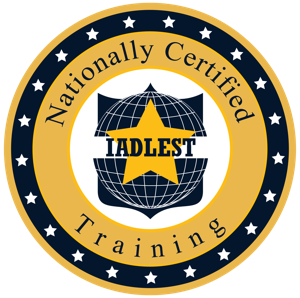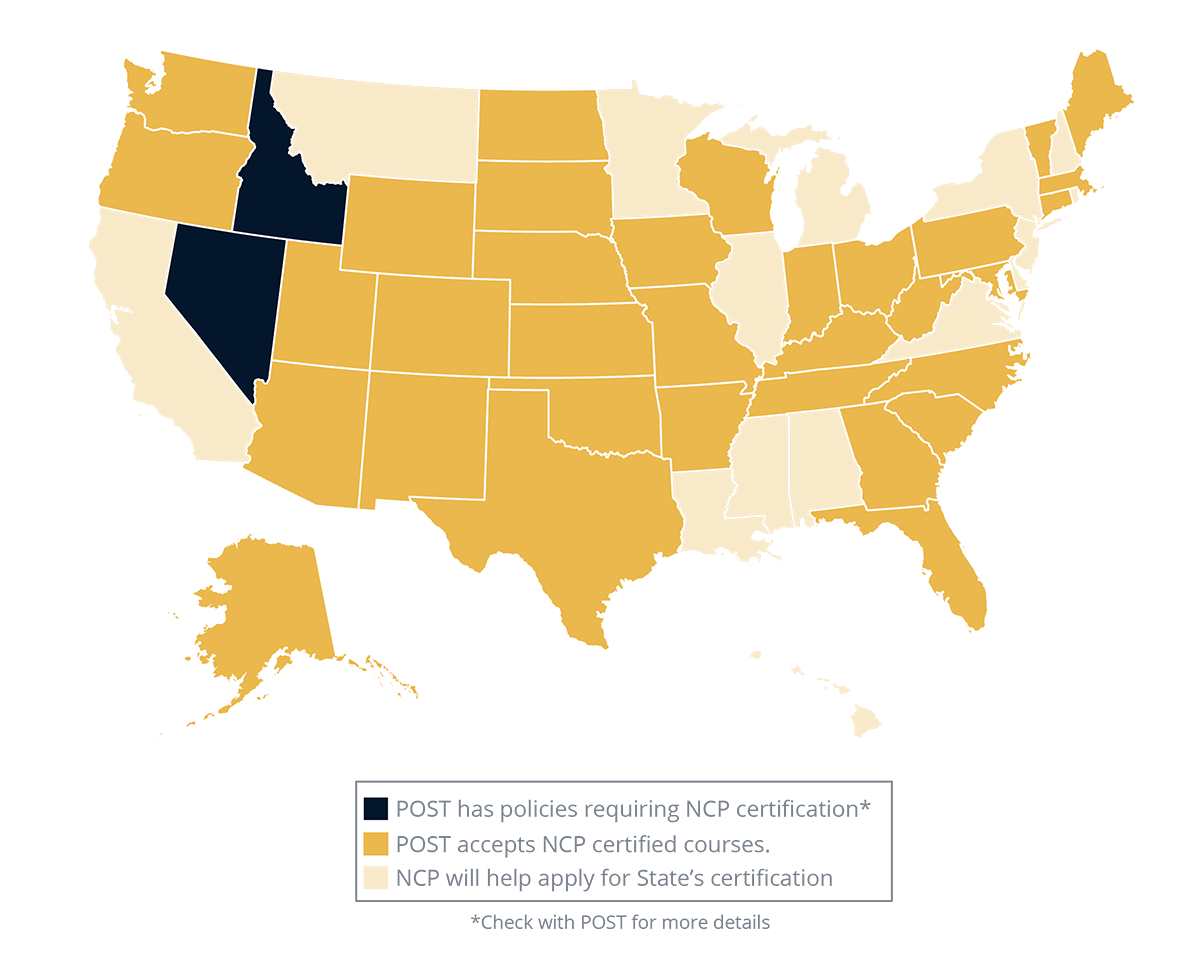Contact Us
To provide feedback on the Community Policing Dispatch, e-mail the editorial board at CPDispatch@usdoj.gov.
To obtain details on COPS Office programs, publications, and resources, contact the COPS Office Response Center at 800-421-6770 or AskCopsRC@usdoj.gov

U.S. Department of Justice
Office of Community Oriented Policing Services
Washington, DC 20530
Though training for fire and medical professionals has long had to meet established standards of quality to merit certification, there have been no national standards for law enforcement training until lately. Each state’s Peace Officer Standards and Training (POST) organization has had its unique process and criteria for awarding in-service or continuing education credit. These processes ranged from a complete review of training curriculum in a few states to no review at all in others. As a result, officers received training of varying degrees of quality, some of it in poor or outdated programs that exposed them and their departments to a host of serious problems, including civil litigation.
To change this situation and ensure a high standard of training throughout the nation, members of the International Association of Directors of Law Enforcement Standards and Training (IADLEST) collaborated with POST organizations throughout the country to develop the National Certification Program (NCP).
Designed to Establish High National Standards of Quality
 Launched in 2015, the NCP was designed to establish and disseminate national certification standards for all vendor-provided criminal justice training, both in a classroom and online. Moreover, the standards set by the NCP have been developed to meet or exceed all current state requirements, thereby ensuring that all vendor-provided training would be accepted by every participating POST organization for in-service or advanced training credit.
Launched in 2015, the NCP was designed to establish and disseminate national certification standards for all vendor-provided criminal justice training, both in a classroom and online. Moreover, the standards set by the NCP have been developed to meet or exceed all current state requirements, thereby ensuring that all vendor-provided training would be accepted by every participating POST organization for in-service or advanced training credit.
To develop these national certification standards, IADLEST employs subject matter experts and curriculum development specialists with extensive experience in law enforcement, professionals who were referred by POST organizations, and other training entities. Once they have been interviewed and accepted into the program, all of these reviewers must attend and pass an IADLEST training course and mentoring program.
The program’s subject matter experts review the curricula, whether developed by vendors or law enforcement agencies, for currency, accuracy, and comprehensiveness, applying the standards required for effective online and in-person training methods and providing feedback for any necessary course improvements. As well as the course content, subject matter experts will also review supporting materials such as course manuals, instructor lesson plans, audiovisual aids, and test instruments.
Simplifying Access to Certified Training Courses
In addition to being able to rely on the quality of the training their officers receive, department leaders or trainers will have an easier time finding it. The IADLEST NCP simplifies access to training by aggregating certified courses in a national training catalog. This not only allows departments to easily search locations throughout the nation for courses from providers that meet the NCP standards but can also reduce costs and improve efficiency by allowing training managers to comparison shop for their training needs.
IADLEST Executive Director Mike Becar says, “The NCP seal will make it easier to select training programs that they know have been critically and independently examined to meet the threshold required for national endorsement.”
A High Standard for Curriculum Quality and Provider Training
But despite the NCP’s high threshold for national certification, IADLEST’s requirements are not intended to make a course difficult to pass. Their goal is to help training providers improve the quality and effectiveness of their courses. IADLEST often works with providers who have initially failed certification to provide feedback that will help them meet NCP standards.
Joe Wolf, Federal Programs Manager for the business training provider Wicklander-Zulawski & Associates, says, “The NCP certification process is thorough and tough. It sets a high bar for training development, content, support, and delivery. However, the criteria for success are clearly established and easy to understand. The NCP staff have been tremendous collaborators and advisors. Our training would never have reached the standard of excellence we’ve achieved without their assistance and commitment.”
Benefits to Officers, Agencies, and Training Providers
NCP’s impact has been widespread. Law enforcement agencies and their officers, training providers, state POSTs, and training academies have all benefited. In addition to the convenience of the IADLEST National Training Catalog, which allows officers and their training managers to shop for the courses they need, the NCP has an online portal which allows officers ongoing access to their training records.
This portal also streamlines the process of reporting officer training compliance to state POSTs, whose directors can be assured that the training has met their state’s requirements.
Academy directors, who have a keen interest in ensuring that the training they provide complies with nationally accepted standards, will be able to submit their courses for national certification and be assured that any NCP course they host will comply with the new national standards.
Training providers can also benefit from the NCP certification process by ensuring that their training programs comply with recognized best practices and can be marketed with the NCP seal of quality. In addition, they too will enjoy the convenience of the NCP eLearning management system by being able to submit their materials to one national portal for certification review and processing, saving them the time and effort of having to submit their courses to each POST agency.
Growing Adoption of the National Certification Program
Law enforcement administrators and organizations from around the country have been quick to recognize these benefits. So far, thirty-six states have adopted the program, with two (Idaho and Nevada) mandating that training provided for in-service credit be NCP certified. The Major County Sheriffs’ Association has also endorsed the National Certification Program. The President of the MCSA, Sheriff Sandra Hutchens, stated, “As an association dedicated to the continuing education of our members, we are very happy to embrace a new, and very high standard, for law enforcement training.”
Due to this kind of recognition by both training providers and law enforcement leaders, as well as endorsement from POST and Academy Directors, the number of NCP-certified providers has increased dramatically in recent months. To meet the growing interest in gaining certification, IADLEST is training and adding new reviewers regularly, to enlarge the staff to 200 qualified reviewers and a larger number of certified courses by the end of 2020. With this effort, these new standards will improve the quality and accessibility of law enforcement training for officers throughout the country.

Subscribe to Email Updates
To sign up for monthly updates or to access your subscriber preferences, please enter your email address in the Subscribe box.






